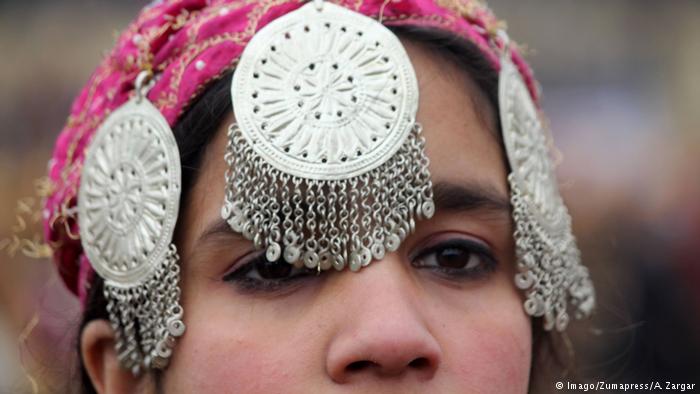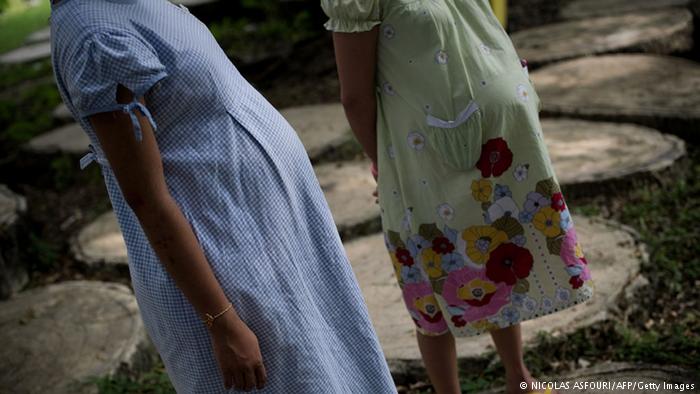‘Go out and kick ass’
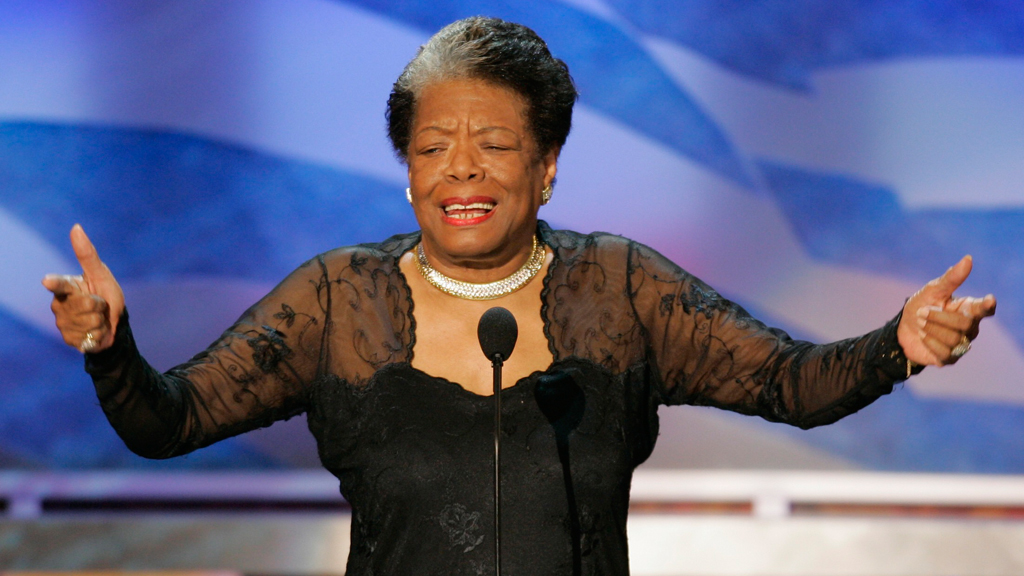 Paridhi Singh wanted to figure out how it would feel to meet a ‘phenomenal’ author like Maya Angelou. So she created this mock interview with the renowned women’s rights activist and poet, who passed away recently at the ripe old age of 86.
Paridhi Singh wanted to figure out how it would feel to meet a ‘phenomenal’ author like Maya Angelou. So she created this mock interview with the renowned women’s rights activist and poet, who passed away recently at the ripe old age of 86.
I was almost intimidated by the sight of Maya Angelou, a six feet tall, imposing woman walking towards me with an air about her. However, what struck me most was the look in her eyes and the composure of her face. I could associate it with the pictures of Buddha and other enlightened sages I had seen. It made me suddenly feel like an 8-year-old who knows nothing about the world and who was meeting someone that had seen and known far too much about it.
“Hello Ma’am, thank you so much for coming” I said, gathering my train of thoughts.
“Call me Maya, child. Sit, sit” she said and smiled.
We sat and ordered coffee and I got to work immediately, I only had an hour with her.
Paridhi Singh: Phenomenal Woman…Outrageous, bold, teasing and everything else that goes with the idea of liberation from the stereotyped identity of who a woman is as created “by the man and for the man.” What inspired this perspective?
I smiled timidly; I was making my nervousness and my inexperience of taking interviews as palpable as I could. The patient smile on Maya’s face helped calm me down.
Maya: The answer to that question is not as simple. What feminism is to me, you ask and why I see it that way?
Well, back in the day, there were many underground clubs and organizations where we, the black rights activists used to meet, socialize and most importantly discuss the future of the ongoing revolution. The spirit of revolution was in the air and many imminent thinkers, philosophers, literary heavyweights and others such were moving about, spreading their opinions as far and wide as they can and taking in other’s as well.
One of the major subjects of my interactions with Malcolm X and Martin Luther King Jr. centered on what vision we saw for the future of the women’s rights movement and we all realized the need to create an “I” for the women. “We don’t want YOU men to give US rights, we are going to take them either way, YOU need US!” is the spirit we wanted to cultivate. It’s only when you feel pride and power brimming over from within can you bring about a change outside by letting it flow freely!
I was 8 when my mother’s boyfriend raped me. I spent five years being a complete mute after that, you know why? I had told my brother about what had happened and soon after that, the man was killed, and I blamed myself, for I thought that it were my words that killed him.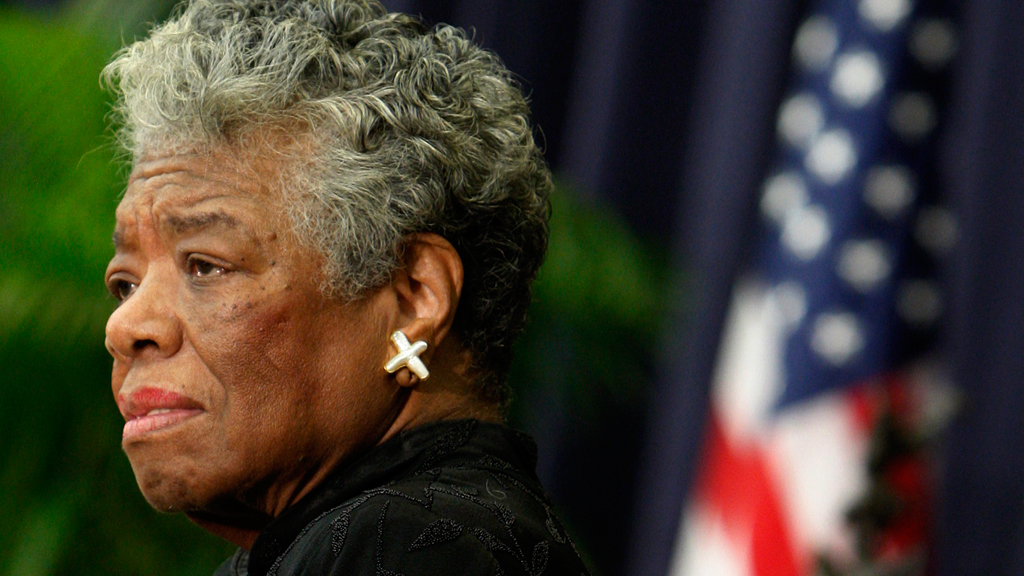
Shock ran across my face, for another reason too than the obvious one. The fact that she went mute not because of the trauma of what she went through but because she thought she was responsible for his death! This somehow seemed incomprehensible, for why would she care for him, after what he did? But I knew the answer to that the minute the question came to my head.
After that there were many other events that followed, my mother abandoned me, I went to live with my grandmother, I even ended up in the prostitution business but somehow came through. You know what it taught me? Nature has no mercy at all. Nature says, “I’m going to snow. If you have on a bikini and no snowshoes, that’s tough. I am going to snow anyway.”
I don’t know if I continue even today, always liking myself. But what I learned to do many years ago was to forgive myself. It is very important for every human being to forgive herself or himself because if you live, you will make mistakes – it is inevitable.
But once you do and you see the mistake, then you forgive yourself and say, “Well, if I’d known better I’d have done better,” that’s all. So you say to people you think you may have injured, “I’m sorry,” and then you say to yourself, “I’m sorry.” If we hold on to the mistake, we can’t see our own glory in the mirror because we have the mistake between our faces and the mirror; we can’t see what we’re capable of being. You can ask forgiveness of others, but in the end the real forgiveness is in one’s own self.
I think that young men and women are so caught by the way they see themselves. Now mind you, when a larger society sees them as unattractive, as threats, as too black or too white or too poor or too fat or too thick or too sexual or too asexual, that’s rough. But you can overcome that. The real difficulty is to overcome how you think about yourself. If we don’t have that we never grow, we never learn, and sure as hell we should never teach.
And hence that perspective emerged. I love to see a young girl go out and grab the world by the lapels. Life’s a bitch. You’ve got to go out and kick ass!
PS: That was insightful indeed. Thank you for sharing your personal experiences with me, I feel honored. Coming back to the poem, now it begins with these lines,
Pretty women wonder where my secret lies
I’m not cute or built to suit a fashion model’s size
It seemed to be directed particularly against white women, if I may be so bold, why that distinction amongst women?
Maya: Ah, I’ll let you in on a little secret. Why is that women try to be a particular body size, spend all their day in the gym sweating it, dieting etc. why is it that when a women does shrivel to a size zero she feels happy? It’s a manufactured happiness, men desire those body types and we submit to it every time we look at a mirror and think, “I am glad my diet’s working!” Feminism is about being comfortable in your skin, feeling empowered no matter you’re black, brown or white!
Also, as far as I knew white women were never lonely, except in books. White men adored them, Black men desired them and Black women worked for them. And yet, the white American man makes the white American woman maybe not superfluous but just a little kind of decoration. Not really important to turning around the wheels of the state. That needed to change! White women needed to be shown the reality and provoked to get out of the chains of comfort of their homes and tea parties and be a part of our collective struggle as women.
The black American woman has never been able to feel that way. No black American man at any time in our history in the United States has been able to feel that he didn’t need that black woman right against him, shoulder to shoulder—in that cotton field, on the auction block, in the ghetto, wherever.
PS: The poem revolves around everyone, men and women alike, trying to unsolved the puzzle of the protagonist to which the answer is repeatedly shown by pointing out to a woman’s body with lines like:
It’s the fire in my eyes
and the flash of my teeth,
the swing of my waist,
and the joy in my feet.
It’s in the arch of my back,
The sun of my smile,
the ride of my breasts,
the grace of my style.
What is the significance? What is the key to the mystery?
Maya: Hah! I am certain you know what the answer to the puzzle is; I answered it when I wrote the poem, and I won’t answer twice! But yes, there is a deeper reason to why I chose to use the body as a frame to send across my message.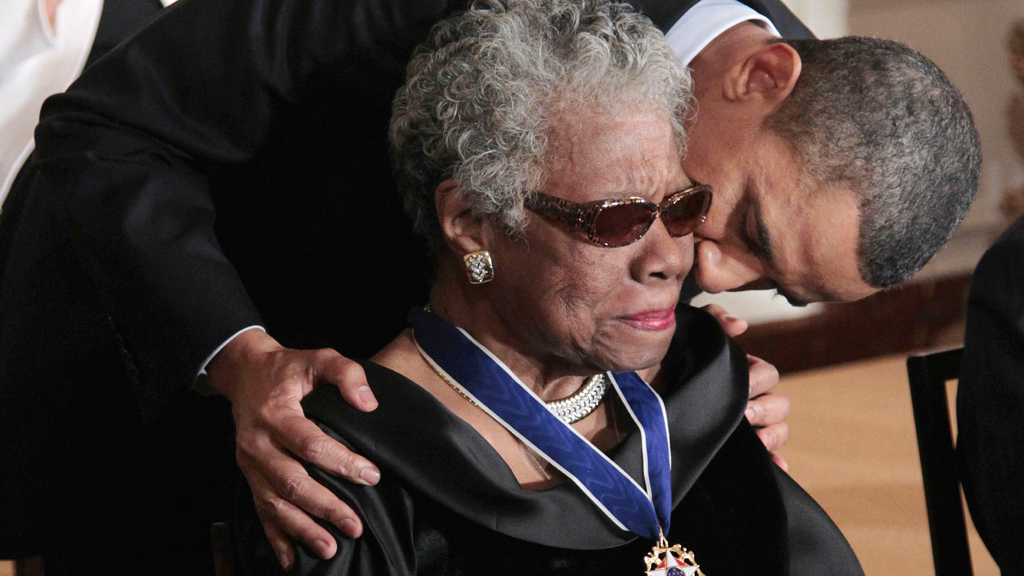
Everything that happened to me, from my molestation, to how I was abused as a prostitute to my unwanted pregnancy, I ended up realizing how my body ended up bearing the brunt of the stigma of my predicaments. I would close my eyes and wish that my soul be detached from my body, but you cannot take away the mind from the body, I knew it and I chose not to fight it.
Over time too, men have used the vulnerability of a women’s body to trample all over her free and pure spirit, the rapes, abuses everything. I decided hell no! I won’t do this to myself, so I chose to get up, only after forgiving myself, and make the most of each and every part of me. With my two hands, I decided to write literature that’d give women and anyone that’s been beaten down, the courage to get up, with my mouth I decided to sing songs that’d revive people from their morbid submission to all the wrongs in life and eventually my body healed and now I am more full of life than ever!
You may not control all the events that happen to you, but you can decide not to be reduced by them.
PS: Another theme of the poem, the significance of which is a bit unclear to me, is from these lines:
Now you understand
just why my head’s not bowed.
I don’t shout or jump about
or have to talk real loud.
When you see me passing
it ought to make you proud.
What exactly is being brought to light here?
Maya: It is quite tiresome to be a man, you know? Constantly having to prove your manhood, having to be conscious of self in public and with everyone everywhere and you know what he asks for it! What is a man, robbed of his cigar and big talk? But a woman like the one in this poem doesn’t need a reason to be proud, doesn’t need to prove why she is proud, for those that know they’re above everyone else will never try and prove it! Acceptance of who one is and contentment with who one is, can only set one free! What a fearsome thing it’d be, if every woman became truly that free.
PS: The last theme in the poem, about the man desiring a woman while intrigued deeply by her mystery, is clearly expressed here:
The fellows stand or
Fall down on their knees.
Then they swarm around me,
A hive of honey bees.
These lines express a man’s handicap,for he needs the care of a woman:
The palm of my hand,
the need of my care.
If a woman really is the center of a man’s universe, then why is our system so flipped?
Maya: It’s simple, whenever man has desired something, he has trapped it. The open birds in free sky, he wanted them, so he built cages. You see how insecure he is? You see, it’s a long time arranging this sort of a condition. If you have a person enslaved, the first thing you must do is to convince yourself that the person is sub-human and hence won’t mind the enslavement. The second thing you must do is convince your allies that the person is sub-human so that you have some support. But the third and the unkindest cut of all is to convince that person that he, she, is not quite a first class citizen. When the complete job has been done, the initiator can go back years later and ask, “Why don’t you people like yourselves more?” You see? It’s been true for women; it’s been true for Indians. So now we have to undo. We know this – and we have to undo these lessons which have been learned by all of us. And not just taught to us – but we’ve learned them. And so it will be no small matter. Doesn’t mean there ain’t no hope though!
PS: I am guessing being an African American woman writer must have been a hindrance to your advancement at many points in your life, was it?
Maya: Clearly not enough, won’t you agree? But in many ways it was and in many others it wasn’t. Being a black and a woman gave me perspectives to the world like no other. I saw life experiences from the veil of an African American and a woman and it helped me understand life better. But yes, it was hard to find any publisher that would even touch my writings, let alone read them. In fact even in my fiction writings, an adult African American female emerging as a formidable character was often met with distaste and even belligerence. Even imagining something along those lines was criminal back in the day!
PS: Speaking of your writing, you’ve expressed yourself through so many different forms of art: dancing, acting, writing, poetry – what is the role or value of art in our society, as a form of media and human expression?
Maya: Well, it reminds us that we are not just flesh and blood. And that our hungers are not going to be set aside as just flesh and blood and that, indeed we have souls. And if a person is religious, I think it’s good, it helps you. But if you’re not, at least you can have the sense that there is a condition inside you which looks at the stars with amazement and awe, that listens to water flowing in a river, or water falling in rain and is lifted up by that and listens to a wonderful singer, wonderful musicians, listens to maybe Duke Ellington or Frank Sinatra or listens to Odetta and Mary J. Blige etc. and thinks whoo! And thinks, yes, hmm, all right now. My soul has been washed. I feel better, I feel stronger. Listen to some good poetry. You see? It keeps us from thinking we are only what our blatant appetites describe us as and it probes us to think far beyond the ordinary!
PS: My final question, what truly inspires you to write?
Maya: If I have to pick one thing, I wouldn’t be able to. So, life brings in a mixture of experiences, some you want to remember and others you spend your life trying to forget. We all come into the world thinking of it as a good place and then when faced with the dark realities of life, our faith comes into question. But what you choose to do about it, is what defines you. I didn’t let my mama’s boyfriend get me down, I didn’t let homelessness get me down, I didn’t let the world get me down! And that spirit is unique to all of us, especially women! But more importantly, I told the world, that I’ll rise higher than I was ever brought down and I’ll carry everyone that was ever put down, with me! So I write, for I find redemption, for I find purpose, for I find happiness in it. I would feel ashamed with myself if I didn’t use the power of words for the greater good. I am a black woman writer and that is my identity and what is a woman without her identity?
PS: Thank you so much for your time, it felt great to have analyzed life under a different lens.
We got up, shook hands, exchanged a warm goodbye and then she went her way.
Author: Paridhi Singh
Editor: Manasi Gopalakrishnan




